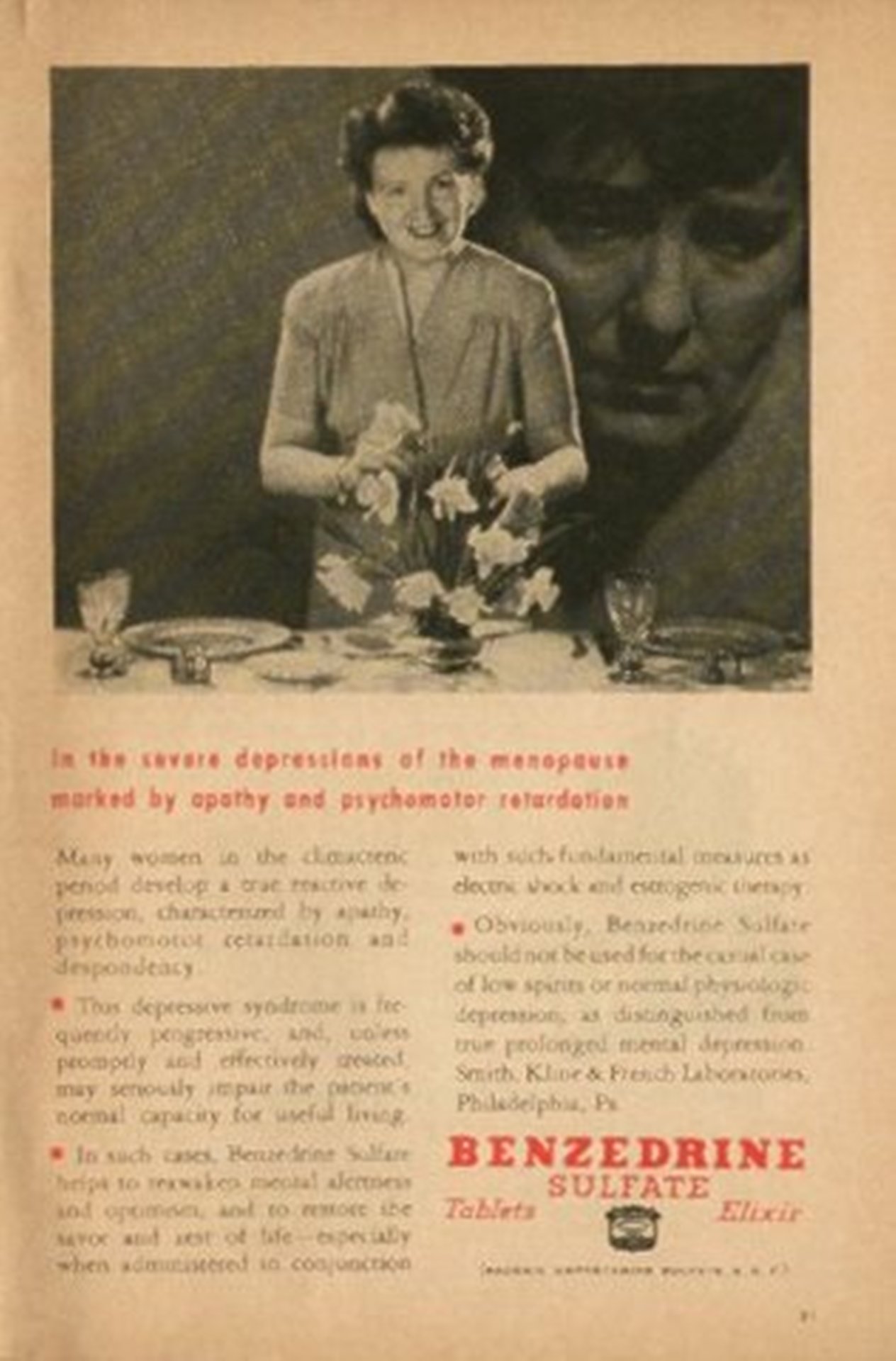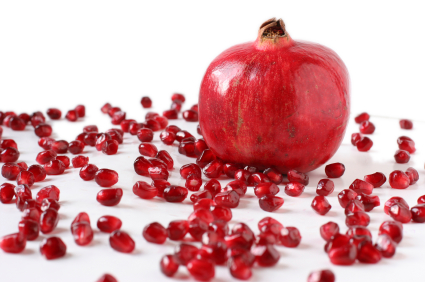“Severe depression? Apathy? Psychomotor retardation?” How about a bennie?
Every now and then, a post deserves a second viewing. This week, I’m bursting the bubble again on vintage advertising. Nothing like an upper for the mid-week blues, right?
“In the severe depressions of the menopause, marked by apathy and psychomotor retardation…”just use a bennie. You’ll be speeding through your day in no time! (And will probably lose that extra weight too!)
Really! What WERE they thinking?!
Read MoreSeaweed and your thyroid
For years, I’ve received requests to write about thyroid disease and menopause. And for years, I’ve swept the topic under the table; that is, until now. However, in light of recent news, I’d like to approach it in a slightly different way. I hope that the following is helpful.
Symptoms of menopause and an underactive thyroid (inability to produce enough thyroid hormone to run the metabolism) can be very similar. In fact, hypothyroidism is 10 times more common in women than in men, and experts say that as many as 10% of all women have some sort of thyroid deficiency. Additionally, risk increases exponentially as we age. Moreover, symptoms like fatigue, depression, weight gain and sexual dysfunction can all be signs of an underactive thyroid and not menopause. More troubling are data from the American Association of Clinical Endocrinologists demonstrating that only one in four women who discussed menopausal symptoms with their practitioners were also tested for thyroid disease.
But what about thyroid cancer? Is there a link to hypothyroidism? And what’s the latest news in that area?
Thyroid cancer is currently one of the fastest growing cancers in the world, and is 2.9 times more likely to occur in women than in men. In fact, last year, doctors from Dana Farber Cancer Institute in Boston reported that for every four patients they were seeing with thyroid cancer, three were women.
Researchers have hypothesized (but have not concluded) that the interaction of the environment, reproductive and menstrual factors account for the disparity in cancer rates between women and men. And just last week, Japanese researchers reported that study findings show that postmenopausal women who consume seawood daily have 3.8 times greater risk for thyroid cancer compared to women who ate it 2 days a week or less. The reason for this may be due to the level of iodine in the seaweed, which has been shown to impair thyroid function and has been specifically linked to the most common type of thyroid cancer — papillary carcinoma.
Importantly, in most cases, thyroid cancer has no early signs or symptoms, and as the cancer grows, it may be diagnosed by a painless lump on the neck, hoarseness, swollen lymph nodes or difficulty swallowing. But take note: while hypothyroidism may increase the risk for heart disease, it has not been linked to a higher risk of thyroid cancer.
It’s all very confusing but the main take-away points are that if you are experiencing menopausal symptoms, be sure that your practitioner tests your thyroid to rule out any sort of thyroid condition. Moreover, if you notice a nodule in your neck, contact a health professional to rule out cancer. Most importantly, 95% of thyroid masses are benign. But you may want to keep iodine intake moderate just to be safe.
Read More
Menopause, an occupational hazard?
Two years ago, I wrote about a UK-based study examining the challenges that women face while working through the transition. Among working women surveyed, a majority reported that the primary factors affecting their ability to function in their job were menopausal-related fatigue and insomnia. During an email exchange, the study’s author noted that “evidence suggests that some women do experience a lot of difficulty – largely tiredness – much of which can be resolved with sensible line management and flexible work. ” However, “as with any other long-term health condition, employees should feel empowered to discuss health conditions with their line manager/supervisor, otherwise the latter are not in a position to help.” Not soon after, I wrote about a study examining how menopause affects occupational health specifically, with study findings showing that total work ability scores declined by almost a half a point for every one point on the total symptoms scale score.
Importantly, these results have finally been published and appear in the March issue of Menopause.
Let’s step back a moment.
If you are unfamiliar with the term “work ability,” it refers to a concept “built upon the balance between a person’s resources and her work demands” and can be used to “predict future impairment and duration of sickness absence.” Within the confines of this definition, it’s no surprise that by and large, women have higher raters of sickness absence than men; just look at the multitasker caretakers in your own circle of friends! Moreover, women that are in the age range most commonly associated with perimenopause and menopause, i.e. 44 to 60, also reportedly have the highest incidence of absence from work, begging the question, is menopause playing a role?
In case you missed the first post on this study, women were asked questions about individual and lifestyle factors that might influence work ability, e.g. BMI, physical activity, smoking status and education. Additionally, menopausal symptoms were measured and analyzed using a scientific scale, and a tool – the Work Ability Index – was employed to evaluate how well the 208 women participating in the study were able to currently perform work. The latter tool focused on work ability compared to best of a lifetime or current demands, impairment due to illness, how often they took sick days over a year’s time and what life was like in general, both at work and at home.
Overall, menopausal symptoms were negatively associated with work ability, in particular, physical symptoms (body aches, joint pain, numbness, feeling dizzy/faint), psychological effects (irritability, feeling blue, anxiety, depression) and education level. Moreover, both physical and psychological symptoms accounted for as much as 36.5% of the different results in work ability among women. Yet, vasomotor symptoms — hot flashes and night sweats — appeared to have little influence on the ability to work, most likely because in this particular set of women, vasomotor symptoms were reported as existing but not (yet) bothersome.
What was lacking in this particular assessment were women who worked outside health and social service industries, who might be engaged in jobs that are less strenuous and physically challenging. Indeed, even in the earlier study, the women were mostly civil servants, i.e. police officers. The researchers note that the group of women they followed may have also had easier access to self help and lifestyle interventions because of their occupational backgrounds, which could have also influenced outcomes. Still, it seems that on some level, symptoms influence work ability and contribute to absence from work. More troubling is the fact that it is well known that women who work appear to have better menopause quality of life.
In essence, we define ourselves, at least in part, by our work. And when we suffer, our work suffers. How do we bridge the gap between work, life and demands of the transition if those demands impact our quality of life in ways that we might not have previously considered? I don’t have any answers. Do you?
Read More
Pomegranate seed oil and hot flashes
Let us go early to the vineyards to see, if the pomegranates are in bloom… Songs of Solomon 7:12
Pomegranates have had a place in the bible and many religions for centuries. A shrub fruit native to the Middle East, the pomegranate is valued in culinary and in complementary and folk medicine circles. As a fruit, there is none so tempting and tantalizing as the pomegranate – its seeds, both sweet and tart, are challenging to obtain and sensual in appearance.
Pomegranate seed oil is a rich source of phytoestrogens, plant-like compounds with estrogen properties that may influence estrogen receptors and modulators in the body. Its main components include linolenic acid (an unsaturated fatty acid that is in the omega-3 family), punicic acid (a conjugated polyunsaturated acid) and ellagic acid (an antioxidant found in many fruits and vegetables). Studies in mice suggest that pomegranate oil may be helpful in lowering blood pressure, counteracting insulin resistance and preventing prostate, colon, lung and breast cancer. Because of its estrogenic properties, it may also be useful for menopausal symptoms. Or not.
A study that appears in the online version of Menopause explores the value of pomegranate seed oil for hot flashes in 81 women. Over a 12 week period, these women received either capsules, twice daily, that contained 30 mg pomegranate seed oil or placebo capsules containing sunflower oil. All women participating in the study were in menopause for at least a year and reported having at least five hot flashes a day. None had taken hormone therapy within 3 months of starting the study, which of course, could affect results.
Women taking pomegranate oil experienced significant benefits, reducing the mean number of hot flashes by 4.3 a day. However, women taking placebo also reported significant reductions in hot flashes by as much as 2.5 per day. After 12 weeks, the pomegranate oil group had a reduction in hot flash frequency by as much as 38.7% compared to the placebo group, who had reductions by as much as 15.6%. Based on these numbers, it would appear that pomegranate seed oil was indeed, significantly more effective than placebo, right? However, the researchers say that the total reduction in the frequency of hot flashes was no different between women taking pomegranate oil and those taking placebo. At the same time? When they tracked the women past this time period (up to 24 weeks), they found that the differences remained, suggesting that the effects of pomegranate oil may be sustainable and even take a longer treatment time to reach its full effect. This warrants looking into its potential with larger studies of longer duration.
One thing to mention is that it did appear that pomegranate seed oil also benefited other symptoms, in particular sleeping disorders, which is in line with other studies looking at isoflavones. And, no side effects or serious adverse events were reported.
So does it or doesn’t it? Undoubtedly, the placebo effect plays a role in all clinical studies, whether or not they are focused on pharmaceutical treatments or complementary therapies. Other studies of phytoestrogens have shown mixed results and a small number have met the criteria for scientific design. Still, there is a question about the role that time plays; many herbal medicines are well known to take some time before reaching full potency in the body in order to exert any sort of intended effect.
I say that the verdict on pomegranate seed oil isn’t in yet. It’s not the panacea we’d like to see but it also isn’t a flat out failure.
Meanwhile, I love that I once heard chef Jose Andres suggest that the best way to access its seeds is to pat it like a baby’s bottom.
Stay tuned for more news on this jewel of the fruit world.
Read More
Wednesday Bubble: Yes, you can!
If you are anything like me, you may not always think you can, even though you are capable, smart and talented. And as women, we often find ourselves questioning our abilities (even though we are capable, smart and talented). For example, when was the last time you asked for a salary increase? Or defended yourself against a bully? Or took the bull by the horns and made that change that you’ve been telling yourself that you are going to make for a zillion months? Well? When?
No worries, because I’m not going to go all kumbaya on you. It’s not my style. But I would like to share my own ‘yes, you can’ moment, in hopes that it might motivate at least one person to take the first step they’ve been procrastinating about taking.
Let’s talk about taking the bull by the horns, aka, there’s no time like the present. First, a bit of context.
The last quarter of 2011 was a trying time for me. Business issues became all consuming, I was traveling a lot, sleeping a little, drinking too much and had swayed from diet. All of which add up to zero. And by the end of this time, I ended up a few pounds heavier, exhausted and truly out of balance. Not a great way to start a new year. And hence, my body revolted, forcing me not only to slow down but to stop entirely; I contracted a viral infection of the inner ear that resulted in terrible vertigo. And if you have ever had vertigo, you know that it ain’t pretty. Or fun.
This year, I have made a few promises to myself, mostly, to shed those couple of pounds that are hanging on, improve my eating habits and try the hardest to stay balanced. The latter part of this does not necessarily jive with my A type personality but so far it’s working. But more importantly? Yesterday I challenged myself to run a 10k at the gym. And I completed it in a fairly good time. Although once an avid runner, I have not run any admirable distance in decades. And it felt really good, AND dragged me out of the January doldrums. Mostly though? I realized that I can; I can get back into a healthy groove, maintain some calm, rethink where I am in my life right now and if it’s where I want to be. And if not, I can define what’s next on the horizon and work towards making it happen. Because, I can kick it. I can run a 10K if I feel like it.
Guess what? So can you.
Promise me that the next time that little voice in your head starts to talk you out of taking a step, even it’s a baby step, that you’ll pause and tell yourself “yes, I can.” And then just try…cuz:
Before this did you really know what life was,
Comprehend to the track for its wide cos,
Gettin mentions on the tip of the vibe buzz,
Rock ‘n’ roll to the beat of the funk fuzz,
Wipe your feet really good on the rhythm rug,
If you feel the urge to freak do the jitter bug,
Come and spread your arms if you really need a hug…
[Lyrics: A Tribe Called Quest]
Kumbaya? Maybe a wee little bit. Wednesday? No bubble this week. Just a little inspiration and whole lot of admiration..
Kick it.
Read More









